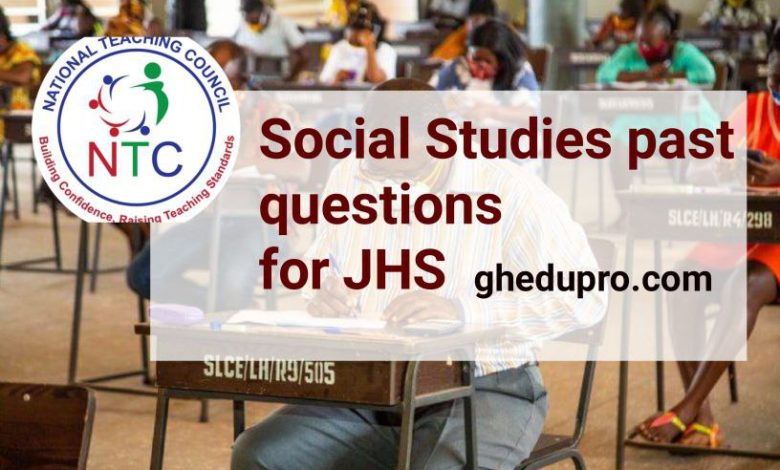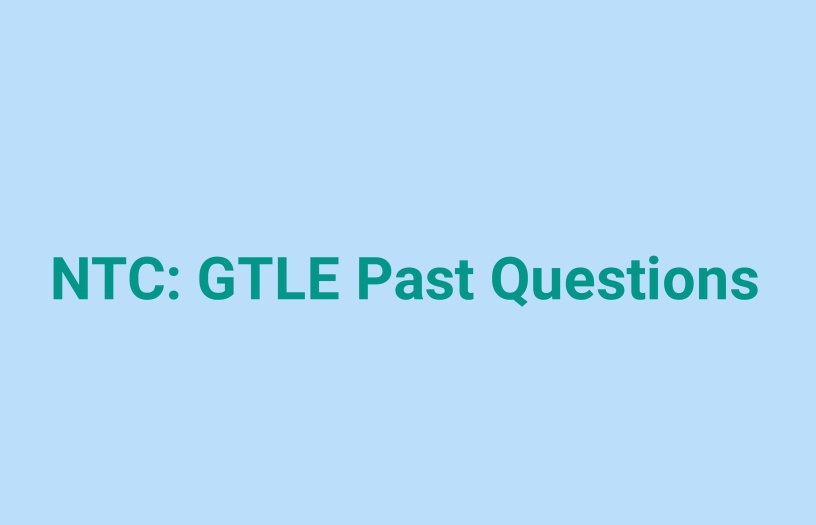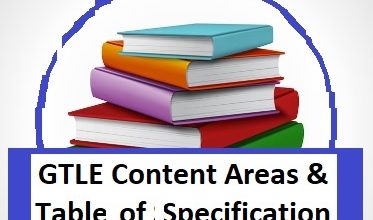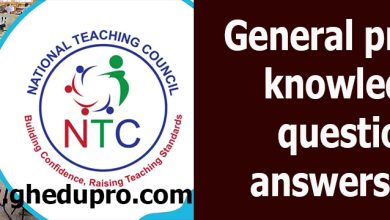GTLE Social Studies Past Questions And Answers for JHS

Are you preparing for the Ghana Teacher Licensure Examination (GTLE) in Social Studies? Or are you a Junior High School (JHS) student, teacher, or trainee teacher who wants to understand past questions better? This blog post is here to help you!
SEE ALSO: [GTLE] Pedagogy for JHS and SHS past question and answers
The Ghana Teacher Licensure Examination (GTLE) is an exam that all trained teachers must pass before they are allowed to teach in public schools.
1. An individual who has false identity is likely to face all the following challenges except…
A. Disgrace
B. Mistrust
C. Rejection
D. Sanction
2. What term is given to gifts, money and drinks presented to the woman’s family under the customary marriage?
A. Bride wealth
B. Dowry
C. Engagement fee
D. Knocking fee
3. People marry for many reasons, which one of the following is the main reason for marriage?
A. Companionship
B. Procreation
C. Support
D. Sexual Satisfaction
4. The biodiversity in Ghana is being threatened of extinction as a result of all the following human activities except…
A. Afforestation
B. Bush burning
C. Deforestation
D. Road construction
5. Formal education has failed partially to tackle the process of socialization because of its emphasis on…
A. Acquisition of knowledge
B. Character training
C. Development of values
D. Higher admission requirement
6. A significant alteration of the structures of society that brings about a difference in the lives of people is referred to as…
A. Community development
B. National growth
C. Social change
D. Sustainable development
7. Peace building is more effective when the feuding parties are…
A. Generous
B. Humble
C. Patriotic
D. Tolerant
8. Ghana has enjoyed some years of continuous development because of relative peace in the country. The peace enjoyed in Ghana could not have been achieved in the atmosphere of…
A. Fairness
B. Mistrust
C. Tolerance
D. Trust
9. John, a twenty-year-old gentleman has been telling his friends that his parents are rich; they own two hotels and three cars even though his parents are poor farmers. Which of the following is the best description of John’s character?
A. Character assassination
B. False identity
C. Self- Identity
D. Undesirable behaviour
10. Which of the following is not an objective for setting up a private business?
A. Creating employment for the youth
B. Generating profit for the owner
C. Making workers more efficient
D. Provision of goods and services in the community
11. Which one of the following is the consequence of false identity? It makes people
A. Engage in delinquent behaviour.
B. Experience objectivity in relationships.
C. Identify their real self.
D. Understand character assassination.
12. Nico used to be a good boy when he was in Form One. … Since they became close friends, Nico started engaging in the negative activities that Joshua was always seen doing. Which one of the following statements best describes their behaviour?
A. Youthful exuberance in school
B. Adolescent irresponsible behaviour
C. Bad influence from friends in school
D. Emulating bad behaviours of friends
13. In order to maintain more girls in school to prevent teenage pregnancy, which of the following measures is the best possible option?
A. Family life education
B. Information on family life
C. Contraceptives usage
D. Reproductive health education
14. Which of the following is not perceived by some Ghanaians as a negative effect of formal education?
A. Alienation of the Ghanaian from his/her culture
B. It leads to fraud and embezzlement of public funds
C. Neglect of the nuclear family system
D. Preference for white collar job
15. A parent thinks of assisting children to use their leisure time profitably in the night… Which one of these socio-cultural practices would be the most appropriate for the parent to involve the children in?
A. Ancestral worship
B. Funeral rites
C. Naming ceremony
D. Story-telling
16. Mr. Kudus got married to the wife of the late Mr. Asani. Which of the following forms of marriage best describes Mr. Kudus’s marriage?
A. Customary
B. Exchange
C. Levirate
D. Ordinance
17. Ghana’s economic and human development is vulnerable to climate change… due to
A. Precipitation
B. Global warming
C. Rainfall
D. Reforestation
18. Which of the following measures would you primarily recommend for the protection of the physical environment?
A. Application of research finding
B. Ensuring environmental education
C. Ensuring environmental conservation
D. Promulgation of environmental laws
19. The alarming rate of deforestation in Ghana can be attributed to human activities. Which one mostly influences deforestation?
A. Building of houses
B. Construction of roads
C. Cutting wood for fuel
D. Farming practices
20. Traditional roles of women in Ghanaian societies have seen some drastic changes…
A. IV only
B. II and III only
C. II, III, and IV only
D. I only
21. Domeabra appears to be a peaceful community… Which concept best describes the situation?
A. Conflict Analysis
B. Conflict resolution
C. Peace building
D. Peace Making
22. Which one of these techniques is the most commonly used in resolving serious conflict in traditional setups?
A. Arbitration
B. Facilitation
C. Mediation
D. Negotiation
23. I possess the characteristics of anonymity, neutrality and permanence… Which institution is being described?
A. Civil service
B. The legislature
C. Judicial service
D. The media
24. Ghana’s expectation from her youth is so high because they…
A. Constitute the potential labour force.
B. Are more knowledgeable and skillful.
C. Are capable of taking risk and adventure.
D. Can take decision easily with ease.
25. Before the introduction of modern scientific farming practices… What is the major reason for burning?
A. Provides ash in the form of potash to fertilize the soil.
B. Prevents weeds from growing again on the land.
C. Allows aeration within the soil.
D. Ensures water gets into the land.
26. Ghana’s school curriculum emphasizes theory… What is the main consequence?
A. More school leavers do not get preferred jobs
B. Country lags behind in technology
C. Progress of the state is affected
D. High rate of unemployment among school leavers
27. Major benefit Ghana will gain from sustained growth and development?
A. Increase in domestic consumption
B. Improvement in democracy
C. Improvement and expansion of infrastructure development
D. Saving funds for future
28. In starting a business, which among the following will be the best order?
A. Accounting procedures
B. Conceiving business idea, Market survey and Market survey
C. Conceiving business idea
D. Market survey
29. Best way to acquire knowledge and skills to develop capabilities?
A. Apprenticeship
B. Job training
C. Informal education
D. Education and training
30. Ghanaian values serve as a source of…
A. Unity and strength
B. Prosperity, peace and harmony
C. National identity
D. Good code of conduct.
31. The physical environment influences farming activities in Ghana in several ways. Which of the following is the major determinant of the farming season in Ghana?
A. Type of crops grown
B. Fertility of the soil
C. Rainfall pattern
D. Kind of tools used
32. The major cause of land degradation in Ghana is…
A. Bush fire
B. Deforestation
C. Overgrazing
D. Pollution
33. Which of the following contributes most to water pollution in Ghana?
A. Sand winning
B. Illegal mining
C. Disposing human excreta into gutters
D. Fishing with chemicals
34. The most appropriate way to maintain peace in the community is through…
A. Tolerance and forgiveness
B. Non-violent communication
C. Dialogue and negotiation
D. Peace education
35. The Ghanaian society is said to be patrilineal because inheritance is passed on through…
A. The mother
B. The father
C. The uncle
D. The nephew
36. Which of the following best explains the term “informal sector”?
A. Sector with low education
B. Sector not regulated by the government
C. Sector dominated by private investors
D. Sector with limited capital
37. Which of these is a major negative effect of child labour on the Ghanaian child?
A. Denial of education
B. Disobedience
C. Malnutrition
D. Poor health
38. The main purpose of environmental conservation is to…
A. Prevent floods
B. Protect natural resources for future generations
C. Reduce bushfires
D. Save animals from extinction
39. One major cause of rural-urban migration in Ghana is…
A. Search for better employment opportunities
B. To visit friends and relatives
C. Poor transportation in rural areas
D. Lack of peace in rural areas
40. Which of the following is a way of promoting national unity in Ghana?
A. Teaching ethnic languages
B. Encouraging rural-urban migration
C. Promoting inter-ethnic marriages
D. Allowing free movement of goods
41. The primary role of the police in Ghana is to…
A. Prosecute criminals
B. Make laws
C. Maintain law and order
D. Protect the president
42. What is the most appropriate way to preserve cultural heritage in Ghana?
A. Encouraging the youth to speak English
B. Teaching traditional values in schools
C. Banning foreign culture
D. Building more museums
43. A person’s character is largely developed through…
A. School education
B. Friends and peers
C. Family upbringing
D. Role models
44. One key feature of a democratic state is…
A. Periodic elections
B. Equal wealth distribution
C. Rule by the rich
D. Absence of police
45. The major source of revenue for the government of Ghana is…
A. Taxes
B. Loans
C. Grants
D. Donations
46. A responsible citizen is one who…
A. Fights for his rights always
B. Obeys the laws of the country
C. Travels outside to find work
D. Avoids political discussions
47. Which of the following is not a right of a child?
A. Right to vote
B. Right to education
C. Right to health
D. Right to protection
48. One reason for promoting girl-child education in Ghana is to…
A. Reduce population growth
B. Empower women for national development
C. Reduce teenage pregnancy
D. Stop early marriages
49. The use of chemicals and explosives in fishing is discouraged because it…
A. Destroys aquatic life
B. Is expensive
C. Makes fishing difficult
D. Is time-consuming
50. What is the significance of civic education to the youth?
A. Makes them wealthy
B. Promotes respect for elders
C. Promotes active participation in national development
D. Encourages traditional practices
51. Which of the following best explains a sense of responsibility?
A. Performing duties without being forced
B. Obeying all rules without question
C. Always depending on others
D. Complaining about challenges
52. The national pledge of Ghana encourages citizens to be…
A. Loyal and patriotic
B. Respectful and obedient
C. Rich and powerful
D. Honest and faithful
53. The main aim of the United Nations is to…
A. Fight for Africa
B. Promote world peace and security
C. Help poor countries
D. Assist in education
54. Which of the following is not a feature of the Ghanaian culture?
A. Food
B. Language
C. Music
D. Technology
55. The practice of female genital mutilation (FGM) is discouraged because it…
A. Promotes culture
B. Endangers the health of women
C. Makes girls submissive
D. Is supported by tradition
56. Civic responsibility includes the following except…
A. Obeying the laws
B. Destroying state property
C. Voting in elections
D. Paying taxes
57. What is the best way to protect water bodies in Ghana?
A. Build more dams
B. Encourage fishing
C. Stop illegal mining activities
D. Dig more wells
58. Which institution is responsible for the protection of Ghana’s environment?
A. Ghana Education Service
B. Environmental Protection Agency
C. Forestry Commission
D. Ghana Standards Authority
59. The main reason for population census is to…
A. Know the number of people in a country
B. Count the number of teachers
C. Register voters
D. Reduce taxes
60. A traditional leader in Ghana is expected to…
A. Settle disputes and promote peace
B. Take part in elections
C. Make laws for the country
D. Form political parties
61. One major benefit of good sanitation is that it…
A. Attracts tourists
B. Prevents bushfires
C. Prevents the spread of diseases
D. Encourages rainfall
62. The term “rule of law” means…
A. Everyone is equal before the law
B. Laws are made by the president
C. Judges are above the law
D. Chiefs control the law
63. The function of the Electoral Commission of Ghana is to…
A. Campaign for political parties
B. Conduct and supervise elections
C. Make laws for elections
D. Count parliamentary votes only
64. Chieftaincy in Ghana is important because it…
A. Gives power to the youth
B. Brings about democracy
C. Preserves our cultural heritage
D. Stops national development
65. The Ghana flag has three colours. The red colour stands for…
A. Blood of those who died for independence
B. The natural resources
C. The country’s peace
D. Agricultural produce
66. A major duty of a citizen is to…
A. Travel abroad
B. Get a job
C. Obey national laws
D. Avoid elections
67. A civic right is…
A. A responsibility of a citizen
B. A benefit a citizen enjoys
C. An election result
D. A court ruling
68. One way of discouraging corruption is by…
A. Reporting corrupt practices
B. Paying people secretly
C. Ignoring wrong acts
D. Supporting corrupt leaders
69. A tourist attraction site in Ghana is…
A. Korle Bu Hospital
B. Legon Campus
C. Kakum National Park
D. Tema Harbour
70. One importance of festivals in Ghana is to…
A. Promote unity and identity
B. Encourage foreigners
C. Replace religions
D. Elect leaders
71. The body responsible for collecting taxes in Ghana is…
A. Ministry of Finance
B. Ghana Revenue Authority
C. Electoral Commission
D. Bank of Ghana
72. Which of the following is not a mineral resource in Ghana?
A. Gold
B. Cocoa
C. Bauxite
D. Diamond
73. A person is said to be employed when he/she…
A. Has a job and earns income
B. Works for a family member
C. Helps people for free
D. Receives gifts
74. Which of the following is not an effect of deforestation?
A. Soil erosion
B. Increased rainfall
C. Climate change
D. Loss of wildlife
75. The youth can contribute to national development by…
A. Watching politics
B. Avoiding work
C. Engaging in community services
D. Joining only sports clubs
76. Which one of these is a formal institution of governance?
A. Opinion leaders
B. Traditional rulers
C. Parliament of Ghana
D. Family heads
77. A good citizen must not…
A. Defend the nation
B. Obey the laws
C. Pay taxes
D. Engage in criminal acts
78. The green colour in Ghana’s flag represents…
A. Forests and agriculture
B. Minerals
C. Peace and harmony
D. The youth
79. How can we show patriotism?
A. Wearing national colours only
B. Singing the national anthem
C. Protecting national property
D. Visiting other countries
80. Which of the following is a key principle of democracy?
A. Majority rule
B. Rule by kings
C. Family leadership
D. Secret judgment
81. A refugee is a person who…
A. Has fled their country due to conflict or disaster
B. Works for the Red Cross
C. Lives on the streets
D. Is looking for a job
82. Pollution of the environment can be reduced through…
A. More industries
B. Bush burning
C. Proper waste disposal
D. Deforestation
83. The major occupation of people living along the coast of Ghana is…
A. Farming
B. Trading
C. Fishing
D. Hunting
84. Which of the following encourages discipline in society?
A. Ignoring crime
B. Avoiding education
C. Enforcing laws
D. Following culture only
85. What does population density mean?
A. How large a town is
B. Number of people per unit area of land
C. Number of houses in a village
D. Number of students in a school
86. One important role of education in national development is…
A. Producing skilled manpower
B. Promoting family names
C. Preserving only traditions
D. Encouraging imports
87. The body that ensures free and fair elections in Ghana is the…
A. Judiciary
B. National Security
C. Electoral Commission
D. Parliament
88. Local government helps to…
A. Make national laws
B. Elect the president
C. Bring government closer to the people
D. Manage international affairs
89. Peaceful elections promote…
A. Conflict resolution
B. Hunger reduction
C. National stability
D. Sports development
90. A society without rules and laws will likely experience…
A. Chaos and disorder
B. Development
C. Peace
D. Cultural growth
91. An example of a natural disaster is…
A. War
B. Earthquake
C. Road accident
D. Robbery
92. The practice of rotating crops on the same piece of land is called…
A. Mixed farming
B. Crop rotation
C. Shifting cultivation
D. Irrigation
93. What is the importance of census data?
A. To measure rainfall
B. To track school attendance
C. To plan for national development
D. To prevent accidents
94. One way to manage waste in schools is to…
A. Provide dustbins
B. Close the canteen
C. Avoid cleaning
D. Burn plastic openly
95. An example of a civic responsibility is…
A. Voting during elections
B. Listening to music
C. Watching football
D. Praying every day
96. A person who values honesty and fairness is showing…
A. Wealth
B. Good character
C. Education
D. Knowledge
97. Who is responsible for making laws in Ghana?
A. President
B. Parliament
C. Chief Justice
D. Police
98. Which one of these helps reduce poverty in Ghana?
A. Spending on funerals
B. Skills training and employment
C. Importing food
D. Free clothes distribution
99. One way to promote sanitation in Ghana is to…
A. Organize regular clean-up exercises
B. Burn all waste
C. Increase prices of food
D. Ban all markets
100. Which of the following groups protects children’s rights in Ghana?
A. Ministry of Sports
B. Electoral Commission
C. Department of Social Welfare
D. Ghana Water Company




